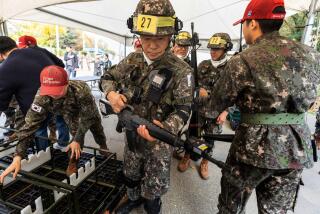Kuwaiti Recruits Trade in BMWs for Bayonets as They Train to Seize Back Emirate
- Share via
DHAHRAN, Saudi Arabia — The first thing you notice is the new cars. Dozens of them are parked neatly on either side of the desert track, relics of a time when the choice between Mercedes and BMW still seemed important to their owners.
Now those owners are lined up on the hardpan field, breathing dust while a large man with a Castro beard leads them in judo maneuvers. They roar, and thrust their left fists forward in unison. They roar again, and attack the air with their right.
In their sweat pants and fake designer T-shirts these recruits are not a sight to strike fear into an Iraqi soldier’s heart. But the purpose of this Kuwaiti army training camp is perhaps more political than military--an attempt to show that Kuwait’s once-pampered princes will do more to get their country back than just pay costs for U.S. troops.
Asked about the cars, one enthusiastic 25-year-old recruit rolled his eyes. “Everybody asks that question,” Ahmed Dhafeeri said. “If I drive a nice car, if I wear nice clothing, that doesn’t mean I don’t love my country.”
Yes, but what kind of car does he drive?
He laughed, and for a moment became a carefree graduate student again. “A Mercedes,” he said, “but I left something better behind in Kuwait.”
What might that be? “The land,” he said.
Except for the parking lot on its outskirts, the camp where Dhafeeri spent a month of training looks like a military relic of World War I. It is a square of hard-packed desert sand, perhaps 300 yards on a side, hemmed in by rows of white military tents. About 600 Kuwaiti youths trained there recently for the civil guard, or militia.
In their 30-day term they learned military drill, some hand-to-hand combat and basic weapon skills such as field-stripping a rifle.
On one particular day, the field was busy. In the foreground, a group of uniformed recruits engaged in what appeared to be bayonet training. The exercise included stabbing at the ground with their muzzles, a move a European TV crew found particularly engrossing and filmed at length. A second uniformed group sat patiently on the ground, watching an instructor quickly strip and clean a submachine gun.
The third group was still practicing martial arts. Their instructor, a burly man in camouflage fatigues, said he is a sergeant in the regular Kuwaiti army. He said he is proud of his charges.
“They have guts,” Sgt. Qubail Rashidi said through an interpreter. “They are anxious to go and fight.”
But would they be ready to face trained Iraqi fighting forces, with tanks and artillery?
“They are children,” Rashidi said contemptuously of the Iraqis.
Not all the trainees are quite so sanguine. Dhafeeri conceded that as a fighting force this still-ragged civil guard isn’t as good as the battle-hardened Iraqis. But the Iraqis, he said, wouldn’t be as motivated as a Kuwaiti force fighting to get back its country. “We fight for a goal,” he said.
Dhafeeri, who was studying criminology at Marshall University in West Virginia, said about 40% of the recruits here are, or were, students like himself.
About 5,000 Kuwaiti soldiers escaped the invading Iraqis. One thousand are now on the front lines, said Col. Faleh, former head of Kuwait’s military academy and an infantry veteran of the 1973 Arab-Israeli War.
Asked obliquely if this force might get in the way instead of helping in a fight, Faleh appears indignant. “They should help free their country,” he said.
Later, a trainee sidled up to a visiting reporter and shyly asked him if he’s an American. Hussein Mutari said his family is now living in Louisiana with his brother, an engineer. “They said, ‘Come with us.’ I said no.”
Asked if he has any message for his family, he looked at the ground. Then he leaned forward, and almost in a whisper said, “Tell them I’m OK.”
More to Read
Sign up for Essential California
The most important California stories and recommendations in your inbox every morning.
You may occasionally receive promotional content from the Los Angeles Times.










